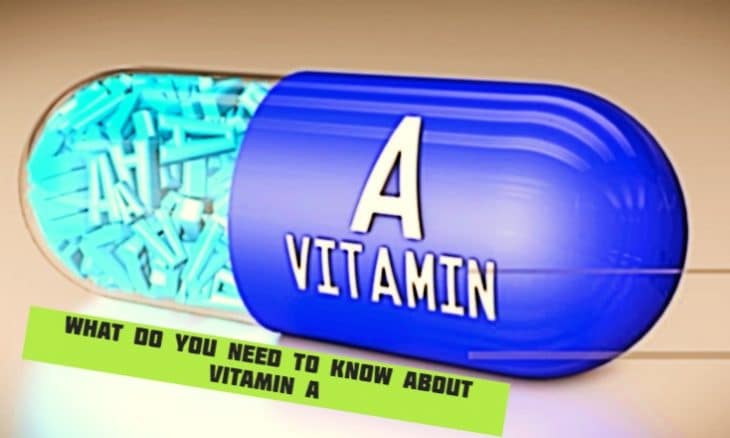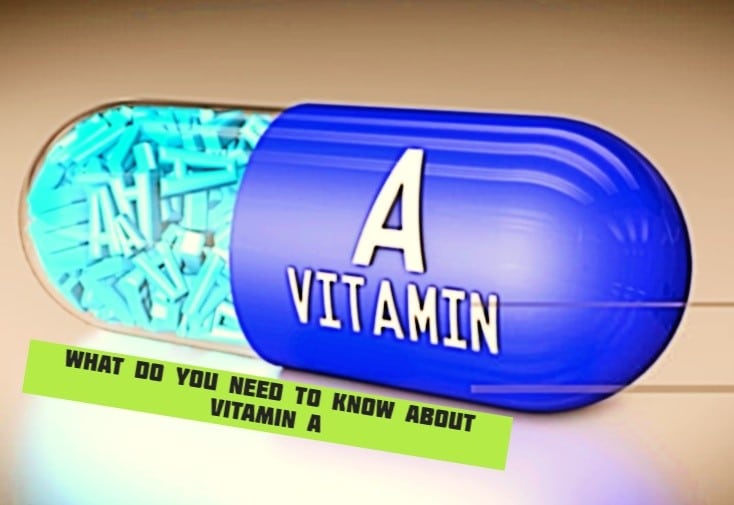
Contents

You may have heard that vitamin A provides the health of your eyes and skin. Are you wondering about your vitamin A intake and the need to take a supplement? Read on what you need to know about vitamin A.
What are the benefits of vitamin A?
Vitamin A is a fat-soluble vitamin that is stored in our liver. It contributes to the natural development and normal growth of the body while maintaining the health of our eyes, skin and immune system. This makes a very important contribution to a healthy vision.
It is usually found in foods of animal origin, but it can also be made from compounds found in foods of plant origin, called carotenoids.
Read Also: Vitamin K: Description, Food Sources, Deficiency, Precautions, Interactions
What are carotenoids?
Carotenoids (phytonutrients) found in various amounts in fruits and vegetables. Brightly colored foods such as dark green, orange, yellow and red fruits, and vegetables contain carotenoids.
There are several types of carotenoids that act differently on our bodies. For example, some carotenoids (such as beta-carotene) can be converted by our body into vitamin A.
Health Zigzag recommends eating a dark green fruit or vegetable and an orange fruit or vegetable every day. Why? Because the carotenoids in these foods contribute to our daily intake of vitamin A.
Read Also: Magnesium: Health benefits, deficiency, sources, and risks
What are your vitamin A needs
| Age | Vitamin A requirements (ug) / day * | Do not exceed (ug / day) * |
|---|---|---|
| Men aged 19 and over | 900 | 3000 |
| Women aged 19 and over | 700 | 3000 |
| Pregnant women (19 years old and over) | 770 | 3000 |
| Nursing Women (19 years and older) | 1300 | 3000 |
Sources of vitamin A in the diet
The table below lists some animal foods that are sources of vitamin A and some foods of plant origin that contain carotenoids.
| Food | Portion | Vitamin A (ug) ER * |
|---|---|---|
| Turkey liver | 75 g (2.5 oz) | 8063 |
| Chicken liver | 75 g (2.5 oz) | 4,054 |
| Cod liver oil | 5 ml (1 teaspoon) | 1,382 |
| Cooked eel | 75 g (2.5 oz) | 853 |
| Soft goat cheese | 50 g (1.5 oz) | 204 |
| Milk (skim, 1%, 2%, chocolate) | 250 ml (1 cup) | 142 - 158 |
| Salmon | 75 (2.5 oz) | 112 |
| Egg | 1 big | 70 |
Of vegetable origin (carotenoids)
| Cooked sweet potato | 1 average | 1,096 |
| Pumpkin, canned | 125 ml (1/2 cup) | 1,007 |
| Carrot juice | 125 ml (1/2 cup) | 966 |
| Cooked carrots | 125 ml (1/2 cup) | 766 |
| Cooked spinach | 125 ml (1/2 cup) | 605 |
| Miniature carrots | 8 carrots | 552 |
| Butternut squash | 125 ml (1/2 cup) | 413 |
| Dried apricots | 1/4 cup (60 ml) | 191 |
| Cantaloupe | 125 ml (1/2 cup) | 143 |
* In retinol equivalents (ER).
What are retinol equivalents? Vitamin A and carotenoids measured differently. It takes a lot more carotenoids to get the same amount of vitamin A from animal sources. Retinol equivalents used to quantify these differences. Here is the formula:
1 μg vitamin A = 12 μg carotenoids = 1 ER
Do I need to take a vitamin A supplement?
No. Taking vitamin A supplements not recommended. High doses of vitamin A are toxic. Our liver can acquire vitamin A for very long periods. This means that even if we do not eat vitamin A-rich foods for a few days, we are not at risk of deficiency.
A balanced and healthy diet, which meets the recommendations of Canada’s Food Guide, will provide you with a sufficient daily intake of vitamin A from foods of animal origin or fruits and vegetables rich in carotenoids such as dark green fruits and vegetables.
Can the skin turn yellow if we eat too many carrots? Yes. This phenomenon occurs because the cells that are under the skin store beta-carotene (which is a yellow-orange pigment). Consuming a large amount of beta-carotene from foods can make the skin yellow, however, there is no danger to health.
Vitamin A and pregnancy
Pregnant women should not take vitamin A supplements and should limit their liver consumption because of their high vitamin A content. Excess vitamin A can cause birth defects.
Supplements designed for pregnant women contain an adequate and safe amount of vitamin A.
Can taking vitamin A or beta-carotene supplements help prevent cancer?
Not. It is not recommended to take vitamin A or beta-carotene supplements to prevent cancer. Some research has shown that in some cases taking supplements can increase the risk of developing certain types of cancer.
Read Also: Breast Cancer: Causes, Symptoms, Risks, and Treatment
Read Also: Skin Cancer: Causes, Symptoms, Types, and Treatment
Ideas for meals and snacks
- Replace the white potatoes with sweet potatoes. Sweet potatoes can be roasted, mashed, cooked or oven and even roasted. They are delicious simply coated with olive oil and grain mustard or sprinkled with maple syrup and brown sugar.
- Compliment all your spinach dishes. Add them to omelets, soups, stews, pasta and rice dishes just before serving. They cook in the blink of an eye and you will have your daily intake of dark green vegetables.
- Make tropical milkshakes with fortified milk or soy beverage and frozen cantaloupe, papaya or mango.
- At work, bring healthy snacks: miniature carrots, dried apricots or red pepper tongues.




